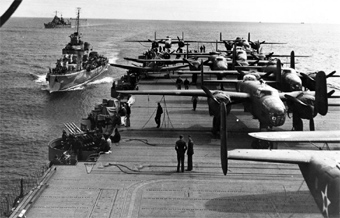
Doolittle’s Raiders to Receive Congressional Honors
| published March 26, 2015 |
By Thursday Review staff
For some of the men, it was essentially a suicide mission. For others, it was a chance to strike a measurable blow to an enemy across an ocean.
In April of 1942, only a few months after the Japanese attack on the United States military facilities at Pearl Harbor, in Hawaii, a contingent of 80 men flew a bomber mission, taking off from aircraft carriers deep in the Pacific and bombing industrial targets in Japan.
The attack was necessary, President Roosevelt believed, in order to immediately take the fight to Japan. More importantly, the mission was the first time a strategic air attack by U.S. forces was executed in World War II, and—though it caused only marginal damage to Japan’s war production at the time—proved to be a hugely successful propaganda tool for the allies, as well as a reality check for the Japanese strategists who, at the time, regarded Japan as too far from the reach of U.S. power to expect retribution for Pearl Harbor.
That top secret mission was led by Lt. Colonel James “Jimmy” Doolittle, and the contingent of pilots and crew who participated in the dramatic and dangerous operation was later known as Doolittle’s Raiders.
The U.S. House of Representatives has voted to bestow upon the members of that raid the Congressional Medal of Honor, the highest award which can be given by the combined U.S. Senate and U.S. House. The medals will officially granted on April 15, but will be presented in a special ceremony on April 18 at the National Museum of the U.S. Air Force.
According to the Air Force, only three flyers have survived the years since the raid: Lt. Col. Richard “Dick” Cole, Lt. Col. Robert L. Hite, and Staff Sergeant David J. Thatcher.
The Air Force Museum’s director and curator, Lt. Gen. Jack Hudson, says that the museum is a natural venue for the event and the honor.
“It is important to pay tribute to the Doolittle Raiders,” Hudson said, “for uplifting the spirits of all Americans, and for their supreme examples of courage, professionalism, creativity, leadership and patriotism.”
All 80 of the men had previously received high honors, including the Distinguished Flying Cross. Of the original 80, eight were captured by the Japanese, three were executed by firing squad, and one died in captivity.
Related Thursday Review articles:
Remembering Doolittle’s Raiders; Earl Perkins; Thursday Review; November 11, 2014.
Patriotism, Honor, and Going for Broke; Earl Perkins; Thursday Review; May 5, 2014.
